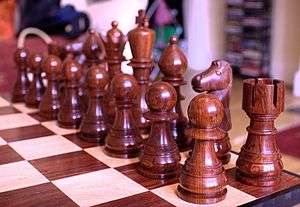Cocobolo

Cocobolo is a tropical hardwood of the tree Dalbergia retusa from Central America. Only the heartwood is used: this is typically orange or reddish-brown in color, often with a figuring of darker irregular traces weaving through the wood. The sapwood (not often used) is a creamy yellow, with a sharp boundary with the heartwood. The heartwood is known to change color after being cut, lending to its appeal.
Cocobolo is oily in look and feel. This oil lends a strong, unmistakable floral odor even to well seasoned wood and occasionally stains the hands with prolonged exposure. Because it stands up well to repeated handling and exposure to water, a common use is in gun grips and knife handles. It is very hard, fine textured, and dense, but is easily machined, although due to the abundance of natural oils, the wood tends to clog abrasives and fine-toothed saw blades, like other very hard, very dense tropical woods. Due to its density and hardness, even a large block of the cut wood will produce a clear musical tone if struck. Cocobolo can be polished to a lustrous, glassy finish. The high natural oil content of the wood makes it difficult to achieve a strong glue joint, and can inhibit the curing of some varnishes, particularly oil-based finishes.
Provenance
Cocobolo is yielded by two to four closely related species of the genus Dalbergia, of which the best known is Dalbergia retusa, a fair-sized tree, reported to reach 15–25 m in height and diameter of one foot: this is probably the species contributing most of the wood in the trade. Because of the wood's beauty and high value, the trees yielding this wood have been heavily exploited: they are rare outside of national parks, reserves and plantations. Only relatively small amounts of this prized wood reach the world market and it is expensive.
Uses
Besides its use in gun grips and knife handles, cocobolo is favored for fine inlay work for custom high-end cue sticks, police batons, pens, brush backs, and musical instruments, especially guitars, drums and basses. Alembic Inc considers cocobolo to be its house wood, and many famous players such as Stanley Clarke use such basses. Jerry Garcia's Tiger (guitar) has a cocobolo top and back. Most-recently acoustic guitars are being made from cocobolo due to limitations in certain tonewoods. Companies like Ibanez and Dean Guitars have launched an exotic wood series featuring cocobolo and other exotic woods (those there are laminates, with a cocobolo veneer). PRS and Taylor guitars have also used solid cocobolo for back and side sets on their higher-end models. Cocobolo is growing in popularity among smaller builders, due to its great acoustic properties much like Brazilian rosewood, and for the fact that it is much more aesthetically pleasing than other more readily available rosewood species such as East Indian rosewood. Some woodwind instruments, such as clarinets, oboes, and bagpipes, have been successfully made using cocobolo instead of the normal grenadilla (African blackwood). More uses include decorative and figured veneers, bowls, jewelry boxes, luxury pens, duck and goose calls, and other expensive specialty items. Some cocobolo has a specific gravity of over 1.0, and will sink in water.
In 2012, C. F. Martin & Co. released a limited-edition guitar in conjunction with performing artist John Mayer. The 00-45SC (SC standing for "Stagecoach") is limited to 25 pieces and features cocobolo back and sides.
Working it
Care must be used when cutting cocobolo, as the wood's oils can induce allergic reactions if inhaled or exposed to unprotected skin and eyes. A dust collection system, coupled with the use of personal protective equipment such as respirators, is highly recommended when machining this wood.
Woods with an oily content, such as cocobolo, can achieve better gluing strength by wiping the surface of both pieces being glued with acetone first. After the acetone has dried, the piece is glued as normal.[1]
Conservation
Logs, sawn wood, and veneer sheets from the Guatemalan populations of Cocobolo (Dalbergia retusa), have been listed under CITES Appendix III since 2008. In 2011, Panama extended that listing to include all products except seeds and pollen and finished products packaged and ready for retail trade.
For the March 2013 CITES Conference of Parties, Belize has proposed uplisting Cocobolo to Appendix II.
In Popular Culture
Bob Odenkirk's character Jimmy McGill on the AMC television series Better Call Saul expresses his desire to get a cocobolo desk.[2]